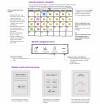Tailored Self-Management App to Support Older Adults With Cancer and Multimorbidity: Development and Usability Testing
- PMID: 38717806
- PMCID: PMC11112470
- DOI: 10.2196/53163
Tailored Self-Management App to Support Older Adults With Cancer and Multimorbidity: Development and Usability Testing
Abstract
Background: Globally, cancer predominates in adults aged older than 60 years, and 70% of older adults have ≥1 chronic condition. Cancer self-management interventions can improve symptom management and confidence, but few interventions target the complex needs of older adults with cancer and multimorbidity. Despite growing evidence of digital health tools in cancer care, there is a paucity of theoretically grounded digital self-management supports for older adults. Many apps for older adults have not been co-designed with older adults to ensure that they are tailored to their specific needs, which would increase usability and uptake.
Objective: We aim to report on the user evaluations of a self- and symptom-management app to support older adults living with cancer and multimorbidity.
Methods: This study used Grey's self-management framework, a design thinking approach, and involved older adults with lived experiences of cancer to design a medium-fidelity app prototype. Older adults with cancer or caregivers were recruited through community organizations or support groups to participate in co-designing or evaluations of the app. Data from interviews were iteratively integrated into the design process and analyzed using descriptive statistics and thematic analyses.
Results: In total, 15 older adults and 3 caregivers (n=18) participated in this study: 10 participated (8 older adults and 2 caregivers) in the design of the low-fidelity prototype, and 10 evaluated (9 older adults and 1 caregiver) the medium-fidelity prototype (2 older adults participated in both phases). Participants emphasized the importance of tracking functions to make sense of information across physical symptoms and psychosocial aspects; a clear display; and the organization of notes and reminders to communicate with care providers. Participants also emphasized the importance of medication initiation or cessation reminders to mitigate concerns related to polypharmacy.
Conclusions: This app has the potential to support the complex health care needs of older adults with cancer, creating a "home base" for symptom management and support. The findings from this study will position the researchers to conduct feasibility testing and real-world implementation.
Keywords: ageing; aging; app; application; applications; apps; cancer; co-design; comorbid; comorbidities; comorbidity; design; design thinking; develop; development; elder; elderly; geriatric; geriatrics; gerontology; mHealth; mobile health; multimorbidities; multimorbidity; older adult; older adults; older people; older person; oncology; self-management; symptom; symptoms; usability; usability testing.
©Sang-Wha Sien, Francis Kyerepagr Kobekyaa, Martine Puts, Leanne Currie, Penelope Hedges, Joanna McGrenere, Caroline Mariano, Kristen R Haase. Originally published in JMIR Aging (https://aging.jmir.org), 08.05.2024.
Conflict of interest statement
Conflicts of Interest: None declared.
Figures
References
-
- Mikkelsen Mk, Lund CM, Vinther A, Tolver A, Johansen JS, Chen I, Ragle AM, Zerahn B, Engell-Noerregaard L, Larsen FO, Theile S, Nielsen DL, Jarden M. Effects of a 12-week multimodal exercise intervention among older patients with advanced cancer: results from a randomized controlled trial. Oncologist. 2022;27(1):67–78. doi: 10.1002/onco.13970. https://europepmc.org/abstract/MED/34498352 6520841 - DOI - PMC - PubMed
-
- Pilleron S, Alqurini N, Ferlay J, Haase KR, Hannan M, Janssen-Heijnen M, Kantilal K, Katanoda K, Kenis C, Lu-Yao G, Matsuda T, Navarrete E, Nikita N, Puts M, Strohschein FJ, Morris EJA. International trends in cancer incidence in middle-aged and older adults in 44 countries. J Geriatr Oncol. 2022;13(3):346–355. doi: 10.1016/j.jgo.2021.11.011.S1879-4068(21)00257-5 - DOI - PubMed
-
- Canadian Cancer Society. Toronto, ON: 2022. [2024-01-31]. Canadian cancer statistics: a 2022 special report on cancer prevalence. https://tinyurl.com/bdurukhb
-
- Corbett T, Lee K, Cummings A, Calman L, Farrington N, Lewis L, Young A, Richardson A, Foster C, Bridges J. Self-management by older people living with cancer and multi-morbidity: a qualitative study. Support Care Cancer. 2022;30(6):4823–4833. doi: 10.1007/s00520-022-06892-z. https://europepmc.org/abstract/MED/35147757 10.1007/s00520-022-06892-z - DOI - PMC - PubMed
Publication types
MeSH terms
LinkOut - more resources
Full Text Sources
Medical



